Topics

Dr. Andrea Hammermann
Senior Economist for Working Conditions and Human Resource Management Policies
Tel: +49 221 4981-314 Mail: hammermann@iwkoeln.de- At the IW since 2013
- Studied business administration at the University of Cologne and doctorate at the RWTH Aachen University.
- Research interests: Changes in the world of work, work-life balance, working hours and place of work, operational performance management, diversity and operational success, individual and organizational resilience.
Research unit
IW Publications
Hammermann, Andrea / Stettes, Oliver, 2024, Verwaiste Chefsessel in deutschen Unternehmen. Einflussfaktoren auf die Karriereambitionen von Beschäftigten – Eindrücke aus dem IW-Personalpanel und der IW-Beschäftigtenbefragung 2023, IW-Report, Nr. 16, Köln
Zur Studie
Bach, Helena / Hammermann, Andrea, 2023, Zahlen tarifgebundene Unternehmen besser? Eine Analyse der Verdienste tarifgebundener und ungebundener Beschäftigter auf Basis des SOEP, in: IW-Trends, 50. Jg., Nr. 4, S. 117-135
Zur Studie
Hammermann, Andrea / Stettes, Oliver, 2023, Büroarbeit im Wandel. Analyse der Arbeitsbedingungen von Bürobeschäftigten, IW-Report, Nr. 62, Köln
Zur Studie
Hammermann, Andrea / Monsef, Roschan Pourkhataei / Stettes, Oliver, 2023, KI und der Arbeitsmarkt. Eine Analyse der Beschäftigungseffekte, IW-Report, Nr. 55, Köln
Zur Studie
Hammermann, Andrea / Monsef, Roschan Pourkhataei, 2023, Ökologischer und digitaler Wandel. Die ökonomische Situation beeinflusst die Wahrnehmung der doppelten Transformation, in: IW-Trends, 50. Jg., Nr. 3, S. 3-26
Zur Studie
Hammermann, Andrea / Schmidt, Jörg / Stettes, Oliver, 2022, Fluktuation auf dem deutschen Arbeitsmarkt. Dynamik von Personalbewegungen und deren Einflussfaktoren, IW-Analyse, Nr. 149, Köln / Berlin
Zur Studie
Dietz, Annette / Hammermann, Andrea / Stettes, Oliver, 2022, Hinter den Kulissen des Auf- und Umbruchs: Betriebe im Transformationsprozess. Einblicke in die Transformationserfahrungen von Beschäftigten und Führungskräften und kulturelle Erfolgsfaktoren gelingender Transformationen, IW-Report, Nr. 34, Köln
Zur Studie
Hammermann, Andrea / Lehr, Judith / Burstedde, Alexander, 2022, HR Analytics. Anwendungsfelder und Erfolgsfaktoren, Studie in Zusammenarbeit mit dem Expertenkreis: Markus Dohm (TÜV Rheinland), Jörg Friedrich (VDMA), Hans-Peter Klös (IW), Christian Lorenz (DGFP), Hans Jürgen Metternich (Evonik), Andreas Ogrinz (BAVC), Christian Vetter (HRForecast), IW-Report, Nr. 28, Köln
Zur Studie
Flüter-Hoffmann, Christiane / Hammermann, Andrea / Monsef, Roschan Pourkhataei, 2021, Betriebliche Einflussfaktoren auf die Inklusion von Menschen mit Behinderungen. Eine empirische Analyse auf Basis der BIBB/BAuA-Erwerbstätigen-befragung 2018, in: IW-Trends, 48. Jg., Nr. 4, S. 3-22
Zur Studie
Hammermann, Andrea / Schmidt, Jörg / Stettes, Oliver, 2020, Zur Ambivalenz flexiblen Arbeitens. Der Einfluss betrieblicher Familienfreundlichkeit, in: IW-Trends, 2020, Nr. 4
Zur Studie
Resilienz stärken mit Zielvereinbarungen
IW-Kurzbericht 41/2019
Ich schaffe das - Das Prinzip der Selbstwirksamkeit
IW-Kurzbericht 1/2019
(in cooperation with Christiane Flüter-Hoffmann, Oliver Stettes)
Individuelle und organisationale Resilienz – Theoretische Konzeption und empirische Analyse auf Basis eines kombinierten Beschäftigten-Betriebsdatensatzes
IW-Analyse – Forschungsbericht Nr. 127/2018
(in cooperation with Oliver Stettes)
Welche Kriterien befördern den Aufstieg auf internen Karriereleitern?
IW-Report 10/2018
(in cooperation with Oliver Stettes)
Stellt die Digitalisierung neue Anforderungen an Führung und Leistungsmanagement?
IW-Trends 4/2017
(in cooperation with Oliver Stettes)
Digitaler Wandel – Chance für ein lebensphasenorientiertes Personalmanagement
IW-Kurzbericht 5/2018
(in cooperation with Matthias Niendorf, Jörg Schmidt)
Zukunft gestalten mit altersheterogenen Belegschaften
IW-Kurzbericht 74/2017
(in cooperation with Oliver Stettes)
Mobiles Arbeiten in Deutschland und Europa – Eine Auswertung auf Basis des European Working Conditions Survey 2015
IW-Trends 3/2017
(in cooperation with Oliver Stettes)
Qualität der Arbeit in Europa – Eine empirische Analyse auf Basis des EWCS 2015
IW-Report 24/2017
(in cooperation with Oliver Stettes)
Familienfreundliche Arbeitswelt im Zeichen der Digitalisierung – Befunde auf Basis des Unternehmensmonitors Familienfreundlichkeit 2016
IW-Trends 4/2016
(in cooperation with Mara Grunewald, Beate Placke)
Personalpolitik durch Nudging – Verhaltensökonomische Untersuchung zum Leistungsmanagement in deutschen Unternehmen
IW-Report 35/2016
(in cooperation with Mara Ewers, Beate Placke)
Zielvereinbarung und ergebnisorientierte Vergütung – Ergebnisorientiert Führen als Alternative zur Präsenzkultur
IW-Kurzbericht 36/2016
(in cooperation with Jörg Schmidt, Oliver Stettes)
A web tool-based equal gender pay analysis for a competitive Europe (equal pacE) – Overview, elements and lessons learned
IW-Report 26/2016
(in cooperation with Hans-Peter Klös)
Digitalisierung und Arbeitsmarkt – Stellungnahme für die Enquetekommission „Zukunft von Handwerk und Mittelstand in NRW“ des Landtages NRW
IW-Report 8/2016
(in cooperation with Oliver Stettes)
Qualifikationsbedarf und Qualifizierung – Anforderungen im Zeichen der Digitalisierung
IW policy papers 3/2016
(in cooperation with Oliver Stettes)
Bewältigung von Stress in einer vernetzten Arbeitswelt – Befunde aus der BIBB/BAuA-Erwerbstätigenbefragung
IW-Trends 2/2015
(in cooperation with Jörg Schmidt)
Facetten des Gender Pay Gap – Empirische Evidenz auf Basis des Sozio-oekonomischen Panels
IW policy papers 8/2015
(in cooperation with Jörg Schmidt, Oliver Stettes)
Beschäftigte zwischen Karriereambitionen und Familienorientierung – Eine empirische Analyse auf Basis der BIBB/BAuA-Erwerbstätigenbefragung 2012
IW-Trends 1/2015
(in cooperation with Jörg Schmidt)
Diversity Management – Empirische Evidenz zur aktiven Förderung der kulturellen Vielfalt in deutschen Unternehmen
IW-Trends 4/2014
(in cooperation with Oliver Stettes)
Lebensphasenorientierte Personalpolitik – Theoretisches Konzept und empirische Evidenz
IW-Analysen – Forschungsberichte Nr. 97, Köln 2014
(in cooperation with Mara Ewers)
Quid pro quo – Die Rolle des Gerechtigkeitsempfindens bei politischen Interventionen
IW policy papers 20/2013
(in cooperation with Oliver Stettes)
Qualität der Arbeit – Zum Einfluss der Arbeitsplatzmerkmale auf die Arbeitszufriedenheit im europäischen Vergleich
IW-Trends 2/2013
Expertises
(in cooperation with Christiane Flüter-Hoffmann, Oliver Stettes)
Erfolg mit flexiblen Arbeitszeitmodellen – Leitfaden für Personalverantwortliche und Geschäftsleitungen
Gutachten für die Inititative Neue Qualität der Arbeit, 2019
(in cooperation with Christiane Flüter-Hoffmann, Christina König, Mona Muckel, Franka Niepmann, Pia Niessen, Nicole Ottersböck, Anna Peck, Stephan Sandrock, Nora Johanna Schüth, Oliver Stettes)
Resilienzkompass: Zur Stärkung der individuellen und organisationalen Resilienz in Unternehmen
Gutachten für das Bundesministerium für Bildung und Forschung, 2018
(in cooperation with Oliver Stettes)
Unternehmensmonitor Familienfreundlichkeit 2016
Gutachten für das Bundesministerium für Familie, Senioren, Frauen und Jugend
(in cooperation with Jörg Schmidt, Oliver Stettes)
Beschäftigung von Zuwanderinnen und Zuwanderern und kulturelle Vielfalt in nordrheinwestfälischen Unternehmen – Eine Befragung auf Basis des IW-Personalpanels
Gutachten für das Land Nordrhein-Westfalen und den Europäischen Sozialfonds, 2014
(in cooperation with Oliver Stettes)
Lebensphasenorientierte Personalpolitik – Theoretisches Konzept und empirische Evidenz
Studie für das Bundesministerium für Wirtschaft und Energie, 2014
External Publications
(in cooperation with Christiane Flüter-Hoffmann)
Umgang mit dem Unbekannten – Resilienz für Betriebe und Beschäftigte: Ergebnisse aus Wissenschaft und Praxis
Handbuch der Aus- und Weiterbildung, Nr. 314, 2019
(in cooperation with Matthias Niendorf, Jörg Schmidt)
Age Diversity and Innovation: Do mixed teams of old and experienced and young and restless employees foster companies innovativeness?
IAB-Discussion Paper, Heft 4, Nürnberg 2019
(in cooperation with Pia Bettenbühl)
Individuelle und organisationale Resilienz stärken
Handbuch der Aus- und Weiterbildung, Nr. 292, Aktualisierungslieferung 2707, 2017
(in cooperation with Jörg Schmidt)
Kulturelle Diversität und Unternehmenserfolg: Grundlegende Zusammenhänge und Strategien für das Diversity Management
Handbuch der Aus- und Weiterbildung, Nr. 286, 2017
(in cooperation with Mara Grunewald, Beate Placke)
Human Resource Management and Nudging: An Experimental Analysis on Goal Settings in German Companies
International Journal of Economics and Finance, Vol. 9, No. 9, 2017
Lebensphasenorientierte Personalpolitik im Spannungsfeld von Unternehmens- und Mitarbeiterinteressen
Lambertus Verlag, Alexis Fritz und Georg Hofmeister (Hrsg.): Attraktiver Arbeitsplatz Caritas- Eine Unternehmenskultur, die hält, was sie verspricht, Freiburg, 2016
Mit Leistungsmanagement und Personalentwicklung zur Personalarbeit 4.0
Handbuch für Aus- und Weiterbildung, Nr. 280, 2016
(in cooperation with Anne Bastien, Rachel Marangozov, Rosa Marvell, Iryna Prus, Alessandra Lazazzara, Marie-Noëlle Lopez)
La migration professionnelle et ses conséquences pour les pratiques RH
Entreprise Personnel (Hrsg.): Etude 330- Panorama n°5, Paris, 2016
Ganzheitlich, bedarfsgerecht, flexibel
neue caritas, Heft 5, 2016
Attraktiv in jeder Lebenslage
EinfachMACHEN – Gute Personalarbeit im ZukunftsLAND, 2016
(in cooperation with Hans-Peter Klös)
Digitalisierung und Industrie 4.0 – Auswirkungen auf das Personal- und Qualifizierungsmanagement
Richard Giesen, Abbo Junker, Volker Rieble (Hrsg.): Industrie 4.0 als Herausforderung des Arbeitsrechts, ZAAR-Schriftenreihe, Bd. 39, 2016, S. 77–101
(in cooperation with Oliver Stettes)
Personalpolitik – Strategie für alle Lebensphasen
Privatbahn Magazin, Heft 5, 2014, S. 126–127
(in cooperation with Alwine Mohnen)
The pric(z)e of hard work: Different incentive effects of non-monetary and monetary prizes
Journal of Economic Psychology, Vol. 43, issue 8, 2014, p. 1–15
Mandatory quotas for women company directors
Information Update 28-02-2014 für das European Industrial Relations Observatory
How unskilled workers’ health deteriorates with age
Information Update 06-08-2013 für das European Working Conditions Observatory
(in cooperation with Sabrina Falk, Alwine Mohnen, Arndt Werner)
Different Degrees of Informational Asymmetry on Job Markets and Its Impact on Companies’ Recruiting Success
Journal of Business Economics, Vol. 83, issue 4, 2013, p. 295–317
(in cooperation with Alwine Mohnen)
Who Benefits from Benefits? Empirical Research on Tangible Incentives
Review of Managerial Science, Vol. 8, issue 3, 2014, p. 327–350
Not Just for the Money, but What For? An Experimental and Empirical Analysis of Immaterial, Tangible and Monetary Incentives
Kovač (Hrsg.): Schriftenreihe Personalwirtschaft, Band 41, Hamburg, 2012
(in cooperation with Alwine Mohnen, Petra Nieken)
Whom to Choose as a Team Mate? A Lab Experiment about In-Group Favouritism
IZA – Institute for the Study of Labour (Hrsg.): IZA Discussion Paper No. 6286, 2012
More from Dr. Andrea Hammermann
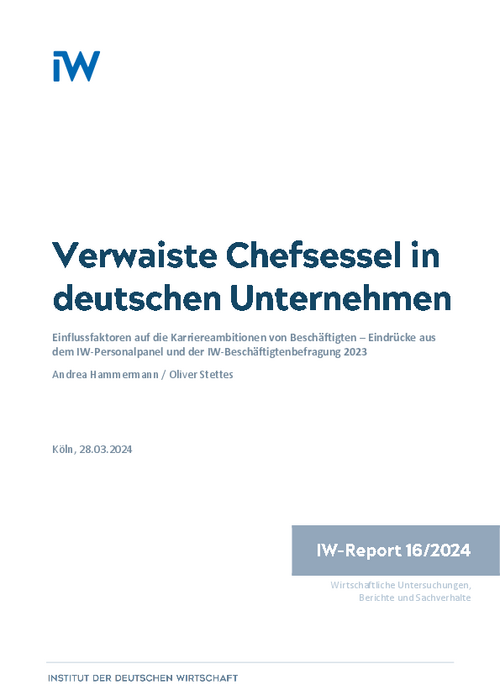
Orphaned executive chairs in German companies
In 2023, half of the companies in Germany reported increasing problems in filling vacancies for management positions because employees are not aiming for a career. Larger companies are less affected than small companies.
IW
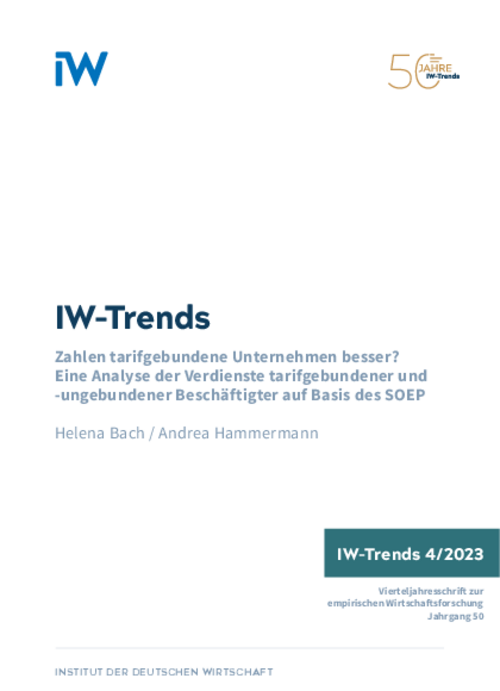
Do Companies Bound by Collective Agreements Pay Better?
When discussing the gradual erosion of collective bargaining coverage, reference is often made to the importance of collective agreements in securing high salaries for employees.
IW
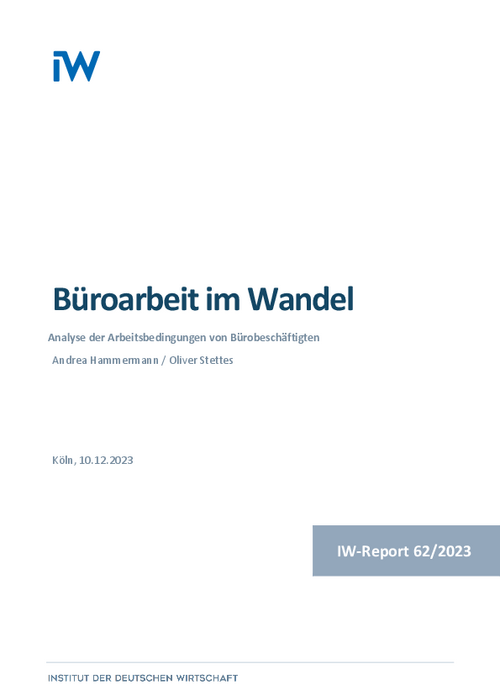
Office work in transition: Analysis of the working conditions of office workers
Office work has changed considerably over time and reflects both technical progress and the zeitgeist of the decades.
IW
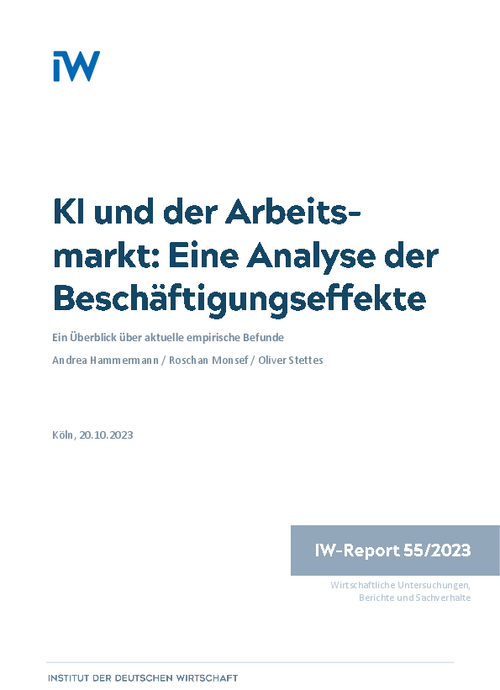
KI and the Labor Market: An Analysis of Employment Effects
It has been about ten years since Frey and Osborne's study on the automation risks of occupations in the USA fuelled the debate on the end of work due to digitalisation worldwide. Since then, numerous scientific studies have been published to examine the employment effects of technology such as robotics.
IW
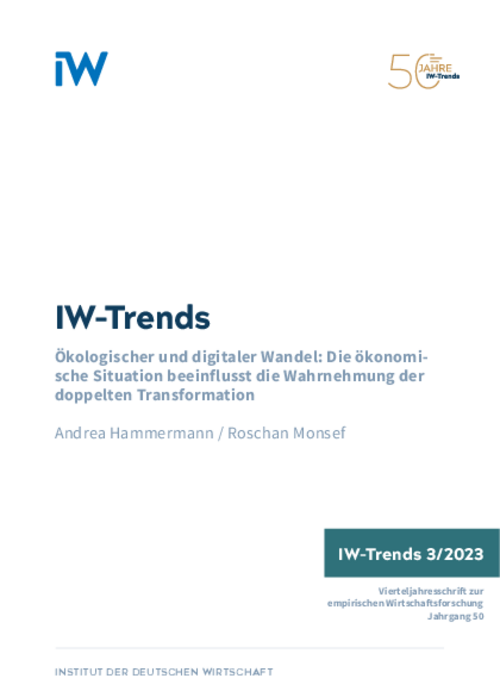
The Ecological and Digital Transformations
The participation of the labour force is a key element in both the ecological and digital transformations, since without their effort and know-how, these parallel processes cannot be successfully completed.
IW
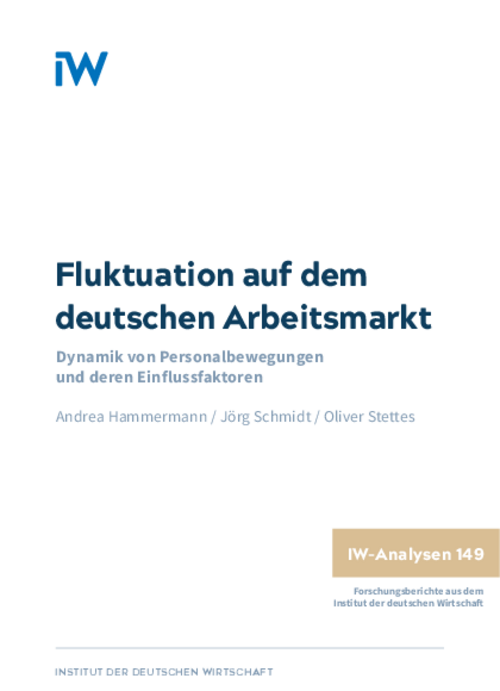
Labour turnover in Germany
Labour turnover in Germany tends to be relatively constant over time but decreases slightly in times of economic crisis, such as the Global Financial Crisis of 2008-2009 or the Covid-19 pandemic.
IW
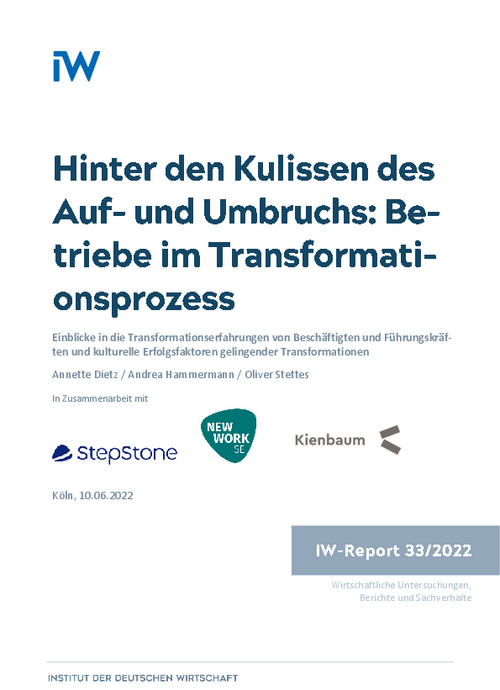
Behind the scenes of upheaval and change: Businesses in the transformation process
The pressure on companies and their employees to change and adapt is enormous against the background of megatrends such as digital and ecological change.
IW
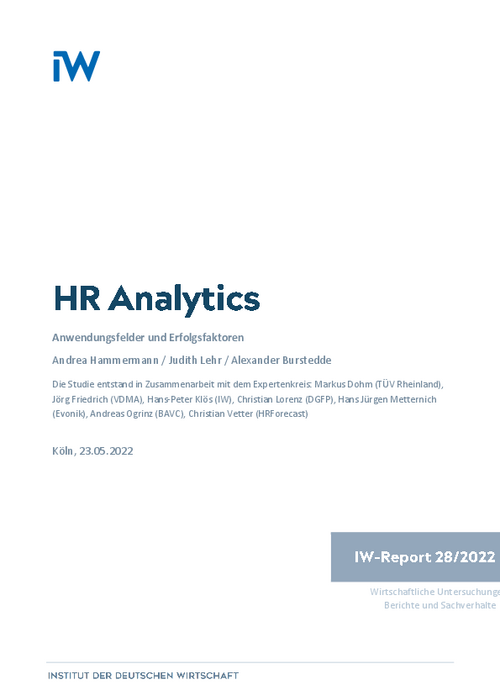
HR Analytics: Fields of application and success factors
In this study, the term HR analytics is used to describe data-based decision-making in HR, whereby the transitions from classic HR controlling to HR analytics, in which various data sources are combined to identify interdependencies and make predictions, are fluid. The study provides an overview of the potential of HR analytics and the success factors for its introduction and use.
IW
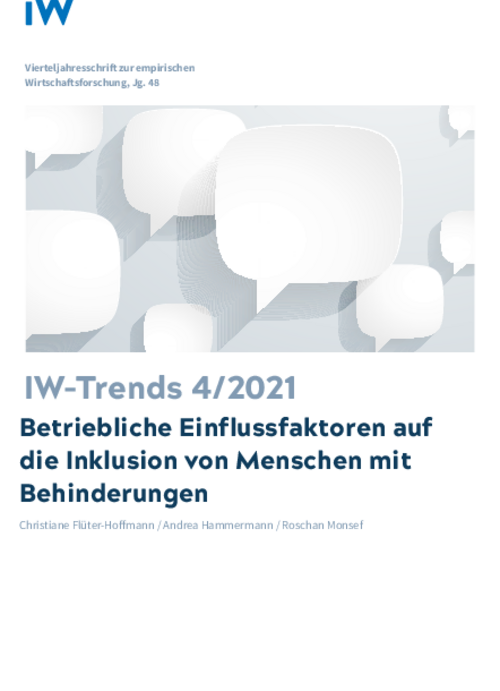
Factors Influencing the Inclusion of People with Disabilities in Companies
The Coronavirus pandemic has shone a spotlight on the extreme importance of social cohesion and professional interaction in the workplace for employees’ well-being and job satisfaction.
IW
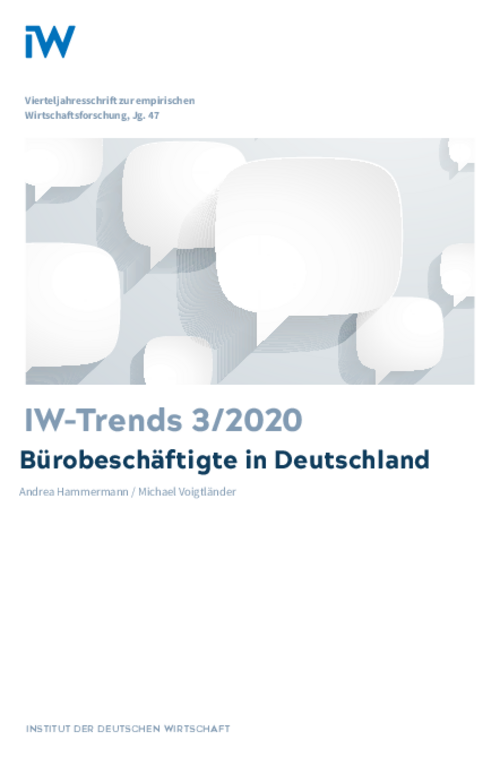
Office-based Employment in Germany: A Regional Analysis
With many regular surveys now discontinued or using outdated methodology, sound data on office- based employment in Germany are hard to come by. The present study aims to make a full national survey possible by developing an approach to measuring administrative employment based on analyses of the BIBB/BAuA Employment Survey, a telephone poll conducted every six years by the Federal Institute for Vocational Education and Training (BIBB) and the Federal Institute for Occupational Safety and Health (BAuA).
IW